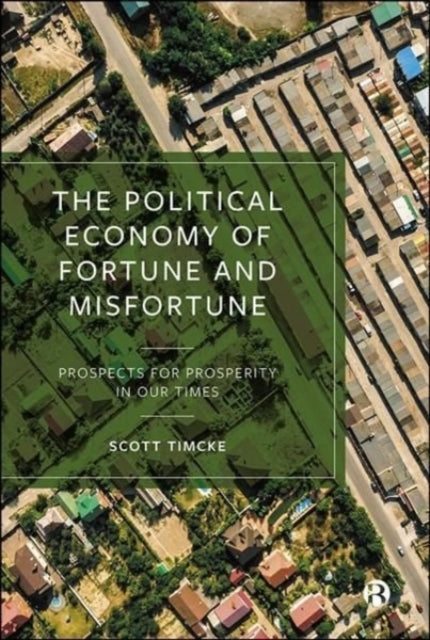ScottTimcke
The Political Economy of Fortune and Misfortune: Prospects for Prosperity in Our Times
The Political Economy of Fortune and Misfortune: Prospects for Prosperity in Our Times
YOU SAVE £14.19
- Condition: Brand new
- UK Delivery times: Usually arrives within 2 - 3 working days
- UK Shipping: Fee starts at £2.39. Subject to product weight & dimension
Bulk ordering. Want 15 or more copies? Get a personalised quote and bigger discounts. Learn more about bulk orders.
Couldn't load pickup availability
- More about The Political Economy of Fortune and Misfortune: Prospects for Prosperity in Our Times
Luck greatly influences a person's quality of life, and institutions can amplify good or bad luck, widening social inequality. This book combines philosophical insights with social theory to offer a political economy of life chances, focusing on the role of luck in redistributive justice in 21st-century capitalism.
Format: Hardback
Length: 180 pages
Publication date: 31 March 2023
Publisher: Bristol University Press
Luck plays a significant role in shaping a person's quality of life, yet our political discourse often fails to address how institutions can either amplify or mitigate the effects of luck, perpetuating social inequality. However, societies have the potential to transform their fortunes. Too often, discussions about inequality revolve around the accuracy of data or modeling, while neglecting the more fundamental ethical and exploitative aspects of the issue. In the wake of growing disparities between the 1% and other classes, this book combines philosophical insights with social theory to provide a much-needed political economy of life chances. Timcke offers a novel perspective on the role of luck in redistributive justice within 21st century capitalism.
Luck's impact on individuals' lives cannot be overstated, as it can significantly influence their opportunities, outcomes, and overall well-being. However, our political systems often overlook the role that institutions play in either amplifying or mitigating the effects of luck, leading to widening social inequalities. This book aims to address this gap by combining philosophical insights with social theory to provide a comprehensive political economy of life chances.
In the introduction, the author highlights the growing disparity between the 1% and other classes, emphasizing the need for a more nuanced understanding of the factors contributing to inequality. The book then delves into the role of luck in redistributive justice, exploring how it shapes individuals' access to resources, opportunities, and social mobility.
One of the key insights offered by the book is that luck is not a random or uncontrollable force, but rather a product of social and economic structures. The author argues that individuals who are born intorivileged families or societies often have a head start in life, with access to better education, healthcare, and other resources that can enhance their chances of success. However, these advantages can be perpetuated by social and economic institutions, such as inheritance laws, merit-based systems, and unequal access to education and job opportunities.
To address these issues, the author proposes a range of policy interventions that aim to level the playing field and promote greater social mobility. These include policies that increase access to education and job training, promote diversity and inclusion in the workplace, and reduce income inequality through progressive taxation and social welfare programs. The author also emphasizes the importance of promoting social cohesion and empathy, recognizing that individuals who are fortunate enough to have more resources should be willing to share them with those who are less fortunate.
Throughout the book, the author draws on a wide range of philosophical and social theory to support his arguments. He references works by thinkers such as Aristotle, Karl Marx, and John Rawls, as well as contemporary social scientists and economists. The book is well-written and accessible, making it suitable for a broad audience interested in understanding the role of luck in shaping social inequality and the potential for social change.
In conclusion, this book provides a valuable contribution to the ongoing debate about inequality and social mobility. By combining philosophical insights with social theory, the author offers a novel perspective on the role of luck in redistributive justice and proposes practical policy interventions that can promote greater social mobility and reduce inequality. While acknowledging the complex and multifaceted nature of the issue, the book encourages readers to think critically about the social and economic structures that perpetuate inequality and work towards creating a more just and equitable society.
Dimension: 234 x 156 (mm)
ISBN-13: 9781529221756
This item can be found in:
UK and International shipping information
UK and International shipping information
UK Delivery and returns information:
- Delivery within 2 - 3 days when ordering in the UK.
- Shipping fee for UK customers from £2.39. Fully tracked shipping service available.
- Returns policy: Return within 30 days of receipt for full refund.
International deliveries:
Shulph Ink now ships to Australia, Belgium, Canada, France, Germany, Ireland, Italy, India, Luxembourg Saudi Arabia, Singapore, Spain, Netherlands, New Zealand, United Arab Emirates, United States of America.
- Delivery times: within 5 - 10 days for international orders.
- Shipping fee: charges vary for overseas orders. Only tracked services are available for most international orders. Some countries have untracked shipping options.
- Customs charges: If ordering to addresses outside the United Kingdom, you may or may not incur additional customs and duties fees during local delivery.


